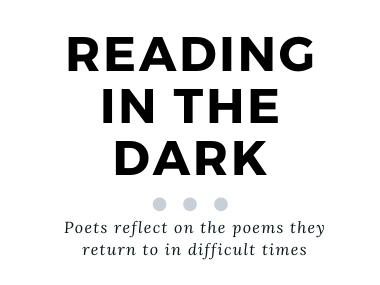Reading in the Dark
Stephanie Burt on Richard Corbet’s “A proper new ballad entitled The Fairies’ Farewell”

A proper new ballad entitled The Fairies’ Farewell
FAREWELL rewards and Fairies!
Good housewives now may say;
For now foule sluts in dairies
Doe fare as well as they;
And though they sweepe their hearths no less
Than mayds were wont to doe,
Yet who of late for cleaneliness
Finds sixe-pence in her shoe?
Lament, lament old Abbies,
The fairies lost command;
They did but change priests babies,
But some have chang'd your land;
And all your children stoln from thence
Are now growne Puritanes,
Who live as changelings ever since,
For love of your demaines.
At morning and at evening both
You merry were and glad,
So little care of sleepe and sloth
These prettie ladies had.
When Tom came home from labour,
Or Ciss to milking rose,
Then merrily went their tabour,
And nimbly went their toes.
Witness those rings and roundelayes
Of theirs, which yet remaine;
Were footed in queene Maries dayes
On many a grassy playne.
But since of late Elizabeth
And later James came in;
They never danc'd on any heath,
As when the time hath bin.
By which wee note the fairies
Were of the old profession:
Their songs were Ave Maries,
Their dances were procession.
But now, alas! they all are dead,
Or gone beyond the seas,
Or farther for religion fled,
Or else they take their ease.
A tell-tale in their company
They never could endure;
And whoso kept not secretly
Their mirth, was punished sure;
It was a just and christian deed
To pinch such blacke and blue;
O how the common-welth doth need
Such justices as you!
Now they have left our quarters;
A register they have,
Who can preserve their charters;
A man both wise and grave.
An hundred of their merry pranks
By one that I could name
Are kept in store; con twenty thanks
To William for the same.
To William Churne of Staffordshire
Give laud and praises due,
Who every meale can mend your cheare
With tales both old and true:
To William all give audience,
And pray yee for his noddle:
For all the fairies evidence
Were lost, if it were addle.
In response to the Coronavirus pandemic, we asked poets to write about the poems they return to in difficult times—to find solace, perspective, or even a moment of delight. Subscribe to the PSA newsletter for more Reading In The Dark responses and to keep updated with the PSA.
There are plenty of 20th and 21st century poems I read and reread and can't keep out of my head, but this morning, our (checks wall calendar) three-hundred-seventy-ninth of remaining at home and going out only for curbside carrot pickup and gulps of fresh air, I found myself returning instead to a poem from the 1640s or early 1650s, by the English clergyman Richard Corbet or Corbett, sometimes called "A proper new ballad entitled The Fairies' Farewell," or else identified by its first line. Corbet laments—as who wouldn't?—the taken-for-granted, constant minor magic and customs and lore of an era that promised to last forever but has now almost passed away. In our case it's a time when we could send our children to school, or visit a bookstore, or maybe (Heaven forfend) go see a rock show, the long-ago age when "flatten the curve" was a rejected aerobicise slogan rather than a public health necessity. In Corbet's case, it's the time before England played host to wars of religion, when (as he sees it) Catholic belief and local semi-pagan superstition coexisted happily in towns and in the countryside, when fairies and other folk could live secure in their pre-iconoclastic, pre-English Civil War toadstool homes. Corbet's fairies were themselves semi-Catholic, displaced by Queen Elizabeth and doubly displaced by the Puritans who won (temporarily) the English Civil War and created a commonwealth. He closes the poem with a prayer of sorts for the health of his region's best elderly folklorist, the figure who can show and tell how things—including fairies—used to be, much as we might conclude a Zoom meeting today with a toast to the health of the notorious RBG.
—Stephanie Burt
Stephanie Burt is the author of three poetry collections, Belmont, Parallel Play, and Popular Music, and several collections of critical works. Her essay collection Close Calls with Nonsense was a finalist for the National Book Critics Circle Award. She taught at Macalester College for several years before becoming a professor of English at Harvard University.

